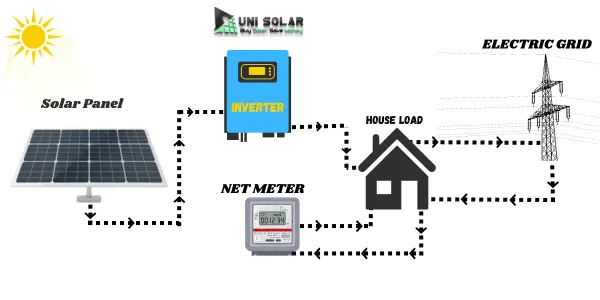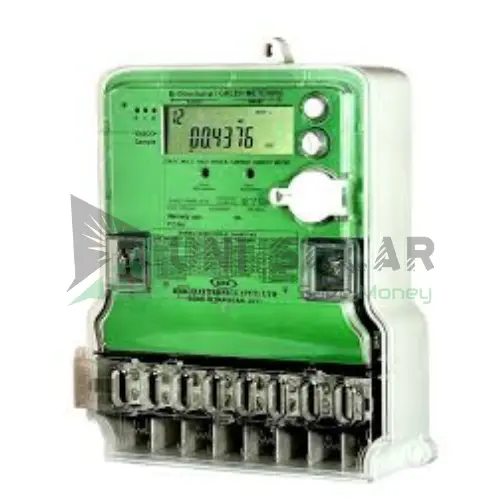
What is net metering?
Net Metering is the process of selling extra electricity to WAPDA.Net metering is a billing mechanism for electricity in Pakistan that benefits users generating their own energy, primarily through solar power. This system allows customers to lower their electricity bills. With this method, individuals can sell any extra electricity generated by their solar panels to a power company. Their electric meter reverses as a result. This implies that during the evenings and storms, they consume less electricity from the power company. They just have to pay for the energy they consume, less the energy their solar panels generate. Policies regarding net metering vary by location within Pakistan but typically involve an annual settlement to manage any excess energy.
Because of the financial savings, this deal promotes the usage of renewable energy. A stronger and more environmentally friendly energy system is also developed with its assistance. In addition to making it simpler to integrate renewable energy sources into the grid, net metering reduces the amount of conventional energy used, which benefits the environment.
How does net metering in Pakistan operate?
People in Pakistan can generate their own electricity from renewable sources, such as solar power. They can receive credits on their electricity account for returning excess energy to the national grid.
Maintaining that this operates consistently across the nation is the National Electric Power Regulatory Authority’s (NEPRA) responsibility.
This is how it operates:
Individuals who use solar energy sources, provide extra electricity to the grid.
For the additional electricity, they receive credits on their bill.
Local businesses install specialized meters that record the amount of energy used and delivered to the grid.
This system lowers the overall demand on the grid, supports renewable energy, and saves money for the users.

Concepts about net metering in Pakistan 2024
Solar panel owners can transmit any excess energy they generate back into the grid through a method called net metering. Their electricity bill credits them for this. This promotes the use of renewable energy sources, benefits the environment, and lowers bills
Installation of the Solar System:
To fully benefit from net metering in Pakistan, installing a solar system is essential. The selection process begins with assessing energy needs and available rooftop space.
Placing the panels on your home or building’s roof is known as installation. By attaching the panels to the solar inverter they convert sunlight into usable energy.
After installing the system, it must be connected to the grid. This step requires coordinating meter installation and grid connection with the local utility company. A bi-directional meter, which tracks both generated and consumed energy, simplifies this process.
Frequent maintenance ensures that the system functions properly. Properly installed and maintained solar systems significantly reduce electricity bills and contribute to the usage of renewable energy.
Preparing the Application:
For applying the net meter in Lahore first determine your roof space and the amount of sunrays received from your roof. Next, collect the required documents, such as your ID card and evidence of your property ownership like legal documents copy. Obtaining comprehensive bids with specifications and costs from licensed solar contractors is critical. Your application, submitted to the local utility company or relevant regulatory authority, should encompass all technical details, safety certifications, and a clear solar installation plan. A thoroughly prepared application facilitates a smooth approval process, enabling the implementation of net metering.
Issuing a No Objection Certificate (NOC) and Inspection:
These steps are pivotal. The local electricity company or another authorized individual inspects the solar system once it is installed to ensure that it complies with all electrical and safety codes. After successful verification, a unique document known as a NOC is issued. Your solar system can be connected to the electricity grid with the help of this paper. You can receive credits for any extra electricity you return to the grid. Because of the NOC, which makes it significant. The operation of the net metering system depends on completing these tasks quickly and accurately.
Signing the agreement:
Executing an agreement is a critical phase in activating a net metering system. Following NOC issuance, the consumer and the local utility company enter into a formal agreement detailing the terms, billing practices, maintenance responsibilities, and tariffs for excess energy supplied to the grid. This contract explicitly outlines the rights and duties of both parties, ensuring the consumer can benefit from net metering. Carefully reviewing the agreement is vital for understanding the commitments and advantages of the arrangement.
Generation License Allocation:
Issuing a generation license is a key component of the net metering framework, officially recognizing the consumer as a small-scale energy producer. This license, granted by the relevant energy regulatory authority after verifying the solar installation’s compliance with national standards, outlines the conditions for producing and supplying electricity to the grid. Obtaining this license is necessary for lawful operation and often a prerequisite for net metering contracts, marking an official entry into the energy market and allowing participation in renewable energy generation benefits.
The Net Meter Activation

Initiating the process with renewable energy incentives involves the crucial step of net meter activation. After the solar installation is complete and the necessary permissions have been obtained, the next step is to turn on the special meter once the solar installation is complete and you have all the necessary permits. The local utility company installed this meter, which tracks how much energy you contribute back and how much electricity you take from the grid.
The utility provider will perform a final inspection as part of this activation to ensure the solar system complies with all safety and technical regulations. Once the net meter receives approval, it signifies that the system is operational. Subsequently, the meter starts tracking the energy exchanges between the user’s solar system and the grid.
Activating the net meter enables consumers to start benefiting from net metering, a scheme where they receive credits for the excess energy generated, thus reducing their overall electricity expenses. This step marks significant progress towards energy efficiency and sustainability, leveraging renewable energy sources.
.
What capabilities make the best home solar system in Pakistan?
| MONTHLY ELECTRICITY UNITS | SYSTEM CAPACITY |
|---|---|
| 100-350 | 3KW Solar System in Pakistan|Lahore |
| 350-600 | 5KW Solar System in Pakistan|Lahore |
| 1100-1200 | 10KW Solar System in Pakistan| Lahore| Islamabad |
| 1700-1850 | 15KW Solar System in Pakistan |
| 2300-2450 | 20KW Solar System in Lahore|Pakistan |
| 3000-3500 | 25kw-30KW Solar System in Pakistan |
| 3800-4200 | 35KW Solar System in Pakistan |
Is Unisolar.pk providing net metering in Pakistan?
Yes, UniSolar.pk offers net metering services in Pakistan, the demand for solar energy is partially met by this new technology. This method improves the usage of renewable energy sources and significantly reduces power prices.
